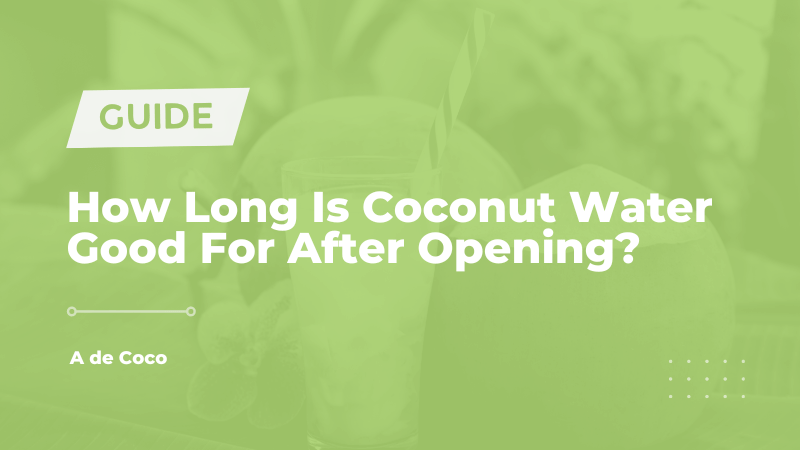In the world of health beverages, the popularity of coconut water continues to rise due to its enticing blend of refreshing flavor and nutritional benefits.
However, there are questions regarding its shelf life which are often overlooked.
Specifically, many consumers are uncertain about how long this tropical drink remains suitable for consumption once the container has been opened.
Providing clarity around this issue is vital in ensuring that we reap the beverage’s full benefits without subjecting ourselves to possible foodborne illnesses.
In this blog post, we will delve deep into the factors that determine its freshness and safety.
Let us demystify the science behind its longevity to foster more informed decisions in our approach to health and wellness.
Contents
- How Long Is Coconut Water Good For After Opening?
- A Step by Step Guide to Properly Storing Opened Coconut Water
- Is There a Difference in Shelf Life of Packaged vs. Fresh Coconut Water?
- Can Coconut Water Go Bad? Understanding the Signs
- How Can Temperature Impact the Shelf Life of Coconut Water?
- What Happens When Coconut Water is Left Out?
- How to Test if Your Coconut Water is Still Good?
- Benefits of Consuming Fresh vs. Stored Coconut Water
- The Bottom Line
How Long Is Coconut Water Good For After Opening?
Once opened, coconut water should be consumed immediately or kept refrigerated and consumed within 24-48 hours. Beyond this point, the freshness and nutritional content may diminish. Unrefrigerated, opened coconut water should be consumed the same day.
Now, while this information about the longevity of coconut water is straightforward, it is also crucial to delve into related aspects to fully understand the topic.
We will be discussing how to store it properly, what signs to look for to determine if the drink has spoiled, and the possible health implications of consuming spoiled coconut water.
This knowledge would help prolong the freshness and enhance your overall experience with this healthy, hydrating drink.
A Step by Step Guide to Properly Storing Opened Coconut Water
One of the most common queries of avid coconut water consumers is about how to properly store an opened can or bottle. Understanding the correct way to store an opened can or bottle of coconut water not only preserves its freshness but also ensures its health benefits are retained.
Therefore, it’s crucial to understand the storage procedures for opened coconut water, specifically when it comes to temperature, storage containers, and its shelf life.
Importance of Temperature
Temperature is the first important factor when it comes to proper storage. After you’ve cracked open a coconut or twisted off the cap on a store-bought bottle, always store the remainder of the coconut water in the refrigerator.
The fridge provides a cool and stable environment for the coconut water to maintain its freshness by slowing down the microbial growth which could violate its purity. Remember, coconut water is a natural product devoid of preservatives; thus, it is prime for spoilage under inappropriate conditions.
A consistently cool temperature is crucial in maintaining the freshness of coconut water.
A cool temperature not only limits bacterial growth, but it also maintains the water’s native tropical taste, providing a refreshing experience every time.
In addition, refrigeration helps in maintaining the overall quality and nutritional content of the beverage. Since heat can adversely affect these aspects, it’s safe to assume that temperature plays a significant role.
Necessity of Proper Storage Containers
When it comes to storing opened coconut water, the type of storage container also plays an essential role. Ideally, you should always use an airtight container to ensure the freshness is locked in.
Leaving leftover coconut water in a container that is not fermented can lead to microbial contamination, which can drastically decrease its shelf life.
Always use an airtight container to store opened coconut water to keep it fresh.
The container material can also have a significant effect. Glass and stainless steel are often considered the best options, as they can withstand cooler temperatures and do not alter the taste of the water. Remember, the goal is to preserve the original flavor, and containers made of plastic or aluminium may not be suitable for this.
Hygiene is another factor to consider when selecting your storage container. Always ensure that the container you select is thoroughly cleaned and dried before storing coconut water to prevent any pre-existing bacteria or mold spores from contaminating your beverage.
Understanding the Shelf Life
Contrary to popular belief, opened coconut water does not stay fresh indefinitely. Realistically, the shelf life of opened coconut water, when refrigerated and stored properly, is typically between 24-48 hours.
The shelf life of opened coconut water, when stored properly, is typically between 24-48 hours.
This short lifespan is why it’s essential to consume opened coconut water as soon as possible. Even the slightest change in flavor, texture, or smell can indicate the water becoming unfit for consumption – and potentially hazardous to your health.
You can prolong the shelf life by immediately refrigerating the coconut water after opening and ensuring it’s stored in a clean and properly sealed container. However, the rule of thumb would always be to consume the water within 1-2 days of storage.
Is There a Difference in Shelf Life of Packaged vs. Fresh Coconut Water?
The question of whether there is a difference in the shelf life of packaged versus fresh coconut water is a commonly asked one.
Understanding Shelf Life
Before we delve into answering it, it’s important to understand what shelf life means.
In the context of food and beverages, the term ‘shelf life’ is used to indicate the length of time a product remains safe to consume and retains its desired properties when stored under appropriate conditions.
It is significant to note that after the shelf life has lapsed, it may not necessarily mean that the product is harmful or unsafe to consume, but rather that the product’s quality and nutritional value may have declined.
The factors that affect the shelf life of a product include its composition, the packaging material used, storage conditions, and the way it’s been processed.
In the context of food and beverages, ‘shelf life’ is used to indicate how long a product remains safe to use and retains its desired properties when stored under appropriate conditions.
After this explanation, it can be concluded that understanding the concept of shelf life is crucial when discussing the comparison between the shelf life of packaged and fresh coconut water.
Packaged vs. Fresh Coconut Water Shelf Life
With this understanding, let’s look into the shelf life differences of packaged and fresh coconut water.
Fresh coconut water, once opened, should ideally be consumed immediately and should not ideally be placed back into the fridge for more than 24-48 hours.
The reason for this brief shelf life is that fresh coconut water has not undergone any pasteurization or preservative processes which would extend its shelf life.
On the other hand, unopened packaged coconut water tends to have a longer shelf life.
This extended shelf life is due to the fact that packaged coconut water usually undergoes pasteurization or other preservation processes which can effectively increase its shelf life.
Therefore, when comparing the shelf life, packaged coconut water has a longer one as compared to fresh coconut water due to the preservation and packaging methods employed during its production process.
However, it’s worth mentioning that once a packaged coconut water container is opened, its shelf life becomes similar to fresh coconut water and should ideally be consumed within 24-48 hours.
Can Coconut Water Go Bad? Understanding the Signs
Coconut water has been a popular beverage in tropical countries for centuries, and it’s now gaining popularity around the globe. Known for its refreshing taste and health benefits, coconut water is an excellent source of hydration.
However, like any other beverage, coconut water can go bad overtime. This process obviously depends on various factors such as the initial quality of the coconut water, the way it’s been stored, the packaging, and how long it’s been open.
A depreciating taste and smell, change in color, presence of mold, or a slimy texture are all probable signs that your coconut water has taken a turn for the worse. It’s critical to immediately discard the coconut water if you notice any of these symptoms, to prevent any health risks.
However, like any other beverage, coconut water can go bad overtime.
While this is an obvious affirmation, it is not uncommon for many to believe that because coconut water is naturally hydrating and salt-rich, it may not expire. This, unfortunately, is a misconception.
Coconut water does have a finite shelf life after it has been opened, and it becomes susceptible to bacterial contamination over time. The salinity and low pH of coconut water inhibit bacterial growth to some extent, but it does not make it immune.
The Role of Packaging and Manufacturing Process
Interestingly, the packaging and manufacturing of coconut water plays a significant role in its shelf life, particularly after it has been opened.
Commercially packaged coconut water typically undergoes a pasteurization process that can extend its shelf life considerably, even after opening. On the contrary, fresh coconut water directly from the coconut does not have this advantage, requiring you to consume it as soon as possible after opening.
Commercially packaged coconut water typically undergoes a pasteurization process that can extend its shelf life considerably, even after opening.
This statement underscores the importance of going through the manufacturing and packaging process of the coconut water you purchase. Understanding these processes can help you make a safer and healthier choice when buying coconut water.
Furthermore, this also sheds light on how the manufacturing industries are playing their part in maintaining the freshness of coconut water while also prolonging its shelf life for better accessibility around the world.
Using the Expiry Date as an Indicator
While taste, smell, texture, and color can be subjective indicators, the expiry date on your packaged coconut water is a concrete sign of whether your coconut water is safe to drink.
If the coconut water is past its expiration date, it is highly recommended that you do not consume it, even if you do not notice any signs of spoilage. The expiration date is an estimate of the product’s quality, and surpassing it can pose potential health risks.
Therefore, always check the expiration date before you enjoy your refreshing glass of coconut water.
Understand and look for the symptoms of spoiled coconut water to safeguard your health. Remember, when in doubt, it is always better to err on the side of caution and discard the questionable beverage.
How Can Temperature Impact the Shelf Life of Coconut Water?
One of the integral factors that determine the shelf life of coconut water is the temperature at which it is stored.
Proper storage conditions can greatly extend the duration for which coconut water remains safe and healthy to consume.
The Role of Refrigeration
Let’s start by emphasizing the importance of refrigeration in preserving coconut water.
As a natural product, coconut water is highly susceptible to spoilage organisms, such as bacteria and yeast, which thrive in warmer temperatures.
The reduction of temperature below room level slows down the microbial activity, thus delaying spoilage and increasing the shelf life of coconut water.
This is especially critical once the coconut has been opened or the packaged coconut water has been unsealed.
Experts recommend consuming refrigerated, opened coconut water within two days for optimal taste and safety.
The reduction of temperature below room level slows down the microbial activity, thus delaying spoilage and increasing the shelf life of coconut water.
This quote emphasizes the importance of low temperature in curbing microbial activity and preserving the freshness of coconut water.
It needs to be understood that refrigeration merely slows down microbial growth without eliminating the microorganisms completely.
Therefore, refrigeration should be viewed as a method that extends, not expunges the shelf life of coconut water.
Impact of Higher Temperatures
On the other hand, higher temperatures can significantly reduce the shelf life of coconut water, accelerating the growth of spoilage organisms.
This is why unrefrigerated, opened coconut water should be consumed within the same day to avoid potential foodborne illnesses.
Once again, this principle applies to both fresh and packaged coconut water.
Unopened, sealed packages of coconut water do not necessarily need to be refrigerated but should be kept in a cool, dry place away from direct sunlight.
As we can see, temperature plays a vital role in determining the duration for which coconut water remains consumable.
This is why unrefrigerated, opened coconut water should be consumed within the same day to avoid potential foodborne illnesses.
Incorporating this information into our routines can ensure that we derive the maximum benefit from this incredibly nutritious beverage.
It also becomes evident that how long coconut water keeps ultimately depends on its storage conditions, primarily the temperature.
This makes it our responsibility to provide the optimal storage conditions for our coconut water.
What Happens When Coconut Water is Left Out?
When we talk about storing coconut water, a multitude of factors come into play and determine the lapse of freshness and nutrition.
One of the most critical elements is temperature, particularly when the coconut water is left out in the open.
When coconut water is left out at room temperature after being opened, it begins to ferment because of the naturally occurring bacteria and yeasts in the coconut water.
This fermentation process can lead to the growth of harmful bacteria that can produce toxins potentially harmful to human health.
Temperature and Fermentation
Fermentation is a natural process that occurs when the sugar in the coconut water reacts with the bacteria and yeast.
This process alters the taste and smell of the coconut water but more importantly, it escalates the risk of bacterial contamination.
If the coconut water is stored at a warmer temperature, the rate of fermentation will increase, which can lead to rapid spoilage.
This fermentation process can lead to the growth of harmful bacteria that can produce toxins potentially harmful to human health.
This point emphasizes the significance of storing the coconut water in a closed container and within a cold environment, preferably the refrigerator after opening.
Doing so restricts the fermentation process and in turn, extends the life of the coconut water.
Significant Nutrient loss
Leaving coconut water out in the open at room temperature not only raises the risk of bacterial build-up but subsequently leads to a considerable loss of nutrients.
Vital antioxidants present in the coconut water begin to degrade in exposure to warm temperatures which ultimately reduces the nutritional value.
Therefore, it’s recommended that coconut water be consumed immediately upon opening to retain its freshness and nutritional value.
How to Test if Your Coconut Water is Still Good?
Look For Changes In Color and Smell
When determining whether your coconut water is still good, the first things to consider are any changes in its color and smell.
Fresh and healthy coconut water usually has a light, clear color and a sweet, nutty scent. Any significant alterations in these characteristics could suggest that the coconut water has gone bad.
A darkened color or a foul, sour, or stale smell usually indicates that the coconut water is no longer suitable for consumption.
Test the Taste
A crucial step in evaluating the freshness of your coconut water is to taste it.
Healthy coconut water has a distinctive, mildly sweet, and nutty taste. If the flavor has turned sour or bitter, it is likely that the drink is no longer safe to consume.
Remember, tasting should be your last resort, after conducting a visual and olfactory examination of the coconut water. Ingesting spoilt food or beverages can lead to food poisoning.
Tasting is indeed an effective method, but one should not rely solely on it when determining if your coconut water is still good.
Foodborne pathogens, which can still linger in food and beverages that taste, look, and smell normal, can cause illness.Always prioritize safety.
Check the Packaging
Checking the packaging is an essential step to determine whether your coconut water is still good.
Packaging that appears bloated or leaks when you crack it open should be discarded immediately as it could indicate bacterial activity that spoils the coconut water.
You should also check the manufacturing and expiration dates. While coconut water may still be safe to consume after the printed expiration date, the quality may have significantly diminished.
Brand’s Preservation Techniques
Different brands employ different preservation techniques to extend the life of their products.
These techniques can include pasteurization, the addition of preservatives, and aseptic packaging.
Brands that do not use any preservatives or artificial means of preservation generally have a shorter shelf life than those who do.
However, it’s also worth noting that these natural brands often offer a purer, more authentic taste.
Different preservation techniques used by brands can affect the shelf life of their coconut water, as well as the taste.
Therefore, when choosing a brand, it’s always a balancing act between shelf life and taste.
Packaging Quality
Apart from preservation techniques, another factor that can impact the shelf life of coconut water is the quality of packaging.
Some brands invest heavily in high-quality, air-tight packaging that helps to keep their products fresh for longer.
Brands that do not use such high-quality packaging might have products that degrade faster.
High-quality, air-tight packaging can significantly extend the shelf life of coconut water.
However, it’s worth noting that brands using high-quality packaging may charge more for their products.
Therefore, you’ll need to decide whether the extended shelf life is worth the additional cost.
Benefits of Consuming Fresh vs. Stored Coconut Water
Coconut water, a beverage derived from the clear liquid inside young coconuts, is increasingly praised for its health benefits and refreshing flavor. However, a major consideration for enthusiasts and newbies alike is the effect of storage versus consuming it fresh.
Fresh Coconut Water
Firstly, it’s crucial to get a grip on the benefits of consuming fresh coconut water. The nutrient-rich sap is packed with essential electrolytes like potassium, magnesium, sodium, and calcium, making it an excellent choice for hydration.
The most significant component of fresh coconut water is its high potassium content, which exceeds the amount found in four bananas. This vital mineral aids nerve function, muscle control, and maintains a healthy heart rhythm.
Besides its rich nutritional content, fresh coconut water is free from additives and preservatives. It is a natural, unadulterated source of nutrients that most health advocates swear by.
The most viable benefit of fresh coconut water is that it’s straight from its natural source, which keeps it free from additives, guarantees its nutrient profile, and offers an undeniably fresh taste.
This freshness not only engrosses its taste but also ensures its natural enzymes and minerals are left intact. It is comparatively low in sugar as opposed to numerous packaged drinks available in the market.
On the downside, fresh coconut water has a noticeably shorter lifespan and needs to be consumed relatively quickly to prevent it from becoming spoiled.
Stored Coconut Water
On the other hand, stored coconut water, particularly the commercially packaged ones, are made convenient and accessible for all. They are available in handy packages, are relatively cheaper, and often have a longer shelf life due to pasteurization or the addition of preservatives.
Regardless, not all coconut water brands are created equal. Some brands utilize heat pasteurization techniques that can compromise the nutrient content of the coconut water. Hence, it is highly recommended to choose brands that use non-thermal processing methods or high-pressure processing (HPP) to retain the highest level of nutrients.
Stored coconut water needs thorough label-checking, as some contain added sugars or flavors that significantly diminish their nutritional benefits. Consequently, consumers should opt for brands with no added sugars or flavors to gain the highest health benefits.
This informs the storage process of coconut water that has a direct impact on the quality of the product. With advancements in processing techniques, stored coconut water can be a great alternative if fresh coconut water is not readily available.
Despite its convenience, stored coconut water may not have the same distinguished flavor profile as its fresh counterpart due to processing methods and added ingredients used to extend its shelf life.
The Bottom Line
Keeping your coconut water fresh and safe to drink involves a series of careful steps, including appropriate storage and keen observation of its qualities.
The shelf life of coconut water varies on whether it’s packaged or freshly extracted.
Coconut water can indeed go bad, with factors like temperature playing a significant role in its preservation.
Leaving coconut water out raises substantial health risks, hence seeking to establish it’s goodness is crucial.
Interestingly, the brand of the coconut water has some bearing on its quality and shelf life.
While the benefits of consuming fresh coconut water outweigh those of stored coconut water, sometimes, circumstances may necessitate the latter.
Some have shared experiences of consuming expired coconut water, highlighting the importance of checking its freshness always.
There’s a science to preserving coconut water that always needs to be better understood, ensuring it retains its freshness and nutrients, making your drinking experience healthy and enjoyable.
M.M. Chowdhury, M.G. Aziz and M.B. Uddin, 2005. Development of Shelf-stable Ready-to-serve Green Coconut Water. Biotechnology, 4: 121-125.



